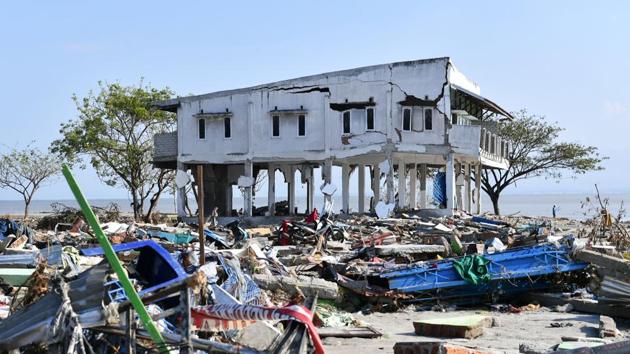‘It’s a zombie town. Nothing’s left,’ says Indonesian earthquake survivor
Nearly 1,400 people are now known to have died in the quake-tsunami that smashed into Indonesia's Sulawesi island as UN officials warned the "needs remain vast" for both desperate survivors and rescue teams still searching for victims.
Hungry survivors of an earthquake and tsunami in Indonesia said on Wednesday they were scavenging for food in farms as President Joko Widodo made a second visit to the area to ramp up aid efforts five days after disaster struck.

The official death toll from the 7.5 magnitude quake that hit the west coast of Sulawesi island last Friday rose to 1,407, many killed by tsunami waves it triggered.
But officials fear the toll could soar, as most of the confirmed dead have come from Palu, a small city 1,500 km (930 miles) northeast of Jakarta, and losses in remote areas remain unknown, as communications are down, and bridges and roads have been destroyed or blocked by landslides.
National disaster mitigation agency spokesman Sutopo Purwo Nugroho said most of the aid effort had been concentrated in Palu, where electricity supply has yet to be restored.
But rescue workers have begun to reach more remote areas in a disaster zone that encompasses 1.4 million people.
Johnny Lim, a restaurant owner reached by telephone in Donggala town, said he was surviving on coconuts.
“It’s a zombie town. Everything’s destroyed. Nothing’s left,” Lim said over a crackling line.
“We’re on our last legs. There’s no food, no water.”
In another part of Donggala district, which has a population of 300,000 people, Ahmad Derajat, said survivors were scavenging for food in fields and orchards.
“What we’re relying on right now is food from farms and sharing whatever we find like sweet potatoes or bananas,” said Derajat whose house was swept away by the tsunami leaving a jumble of furniture, collapsed tin roofs and wooden beams.
“Why aren’t they dropping aid by helicopter?” he asked.
Aid worker Lian Gogali described a perilous situation in Donggala, which includes a string of cut-off, small towns along a coast road north of Palu close to the quake’s epicentre.
“Everyone is desperate for food and water. There’s no food, water, or gasoline. The government is missing,” Gogali said, adding that her aid group had only been able to send in a trickle of rations by motorbike.
Underlining a growing sense of urgency, President Widodo made his second visit to the disaster zone, putting on an orange hard hat to talk to rescue workers at a collapsed hotel in Palu.
“What I’ve observed after returning now is heavy equipment has arrived, logistics have started to arrive although it’s not at maximum yet, fuel has partly arrived,” Widodo told reporters.
‘President not hearing’
Widodo, who will seek re-election next year, called on Tuesday for reinforcements in the search for victims, saying everyone had to be found. He repeated that on Wednesday, after inspecting what he called an “evacuation” effort at the Hotel Roa Roa, where he said some 30 people lay buried in the ruins.
Yahdi Basma, a leader from a village south of Palu hoping to get his family on a cargo plane out, said Widodo had no idea of the extent of the suffering.
“The president is not hearing about the remote areas, only about the tsunami and about Palu,” he said.
“There are hundreds of people still buried under the mud in my village ... There is no aid whatsoever which is why we’re leaving.”
At least seven cargo planes arrived at Palu airport earlier on Wednesday carrying tonnes of aid, some bedecked in the red and white national colours and stamped with the presidential office seal declaring: “Assistance from the President of Republic of Indonesia”.
The quake brought down hotels, shopping malls and thousands of houses in Palu, while tsunami waves as high as six metres (20 feet) scoured its beachfront shortly afterwards.
About 1,700 houses in one neighbourhood were swallowed up by ground liquefaction, which happens when soil shaken by an earthquake behaves like a liquid, and hundreds of people are believed to have perished, the disaster agency said.
Adding to Sulawesi’s woes, the Soputan volcano in the north of the island, about 600 km (375 miles) northeast of Palu, erupted early on Wednesday but there were no reports of any casualties or damage.
Nugroho said aircraft, tents, water treatment facilities and generators were the main needs for survivors including more than 70,000 displaced people.
The government has said it would accept offers of international aid, after shunning outside help this year when two major earthquakes struck Lombok island, south of Sulawesi.
Sitting on the seismically active Pacific Ring of Fire, Indonesia is one of the world’s most vulnerable countries to quakes and tsunamis. A quake in 2004 triggered a tsunami across the Indian Ocean that killed 226,000 people in 13 countries, including more than 120,000 in Indonesia.



